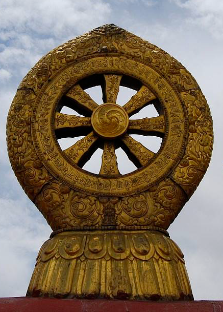The most renowned Buddhist insight, or prajna, concerns what is often called The Noble Eightfold Path (Pali: ariya aṭṭhaṅgika magga; Sanskrit: āryāṣṭāṅgamārga). This comes from Pali and Sanskrit Buddhist texts which preserve ancient teachings of Gautama Buddha. The Sutta Pitaka sums up The Noble Eightfold Path, highlighting that ‘right concentration’ (the samadhi state) is a consequence of competence in ‘right view’, ‘right resolve’, ‘right speech’, ‘right action’, ‘right livelihood’, ‘right effort’, ‘right mindfulness’. ‘Right concentration’ (the samadhi state), while being one of the Eight precepts, overarches and encapsulates the contemplation of the additional precepts.

Chris Falter, CC BY-SA 3.0, via Wikimedia Commons
The idea conveyed in the term ‘Noble Eightfold Path’ is not that the Path itself is noble (ariya), but rather that those who take this Path (magga) are noble. The Path itself comprises eight ‘right’ (samma) intentions and actions which the Buddha and Buddhist prajna has preserved for us. This path is ‘right’ in that it aligns with merit. Thus those who stay on this Path are those who are noble (ariya) as they gain good merit. ‘Right speech’, ‘right action’, and ‘right livelihood’, refer to moral virtues (Sanskrit: śīla, Pāli: sīla), whereas ‘right view’ and ‘right resolve’ refer to insight and wisdom (Sanskrit: prajñā, Pāli: paññā). Lastly, ‘right effort’, ‘right mindfulness’, and most importantly, ‘right concentration’ fall into meditation (Sanskrit and Pāli: samādhi). These aforementioned divisions for the Noble Eightfold Path are also used synonymously with Buddha’s threefold training, with each threefold partition being virtue, wisdom, and mind, respectfully.
But how many are noble enough to stay on this Path?
We saw how the ancient Hebrew Scriptures recorded how mankind corrupted from the original created image of God.
Some misunderstand the Bible to mean we are blamed for this original rebellion. In fact, the only one blamed is Adam but we live in the consequences of that rebellion. Think of it genetically; children acquire the traits of their parents – good and bad – by inheriting their genes. People have inherited Adam’s mutinous nature and thus naturally, almost unconsciously, but willfully we continue the uprising that he started. We may not want to be God of the universe, but we want to be gods in our settings. This causes us to miss the Noble Path.
The Effects of Sin So Visible in Society
And this explains so much of human life that we take for granted. This is the reason that everywhere people need locks on their doors. Why do we need police, lawyers, and encryption passwords for banking? Because in our current state, we steal from each other. This explains why empires and societies eventually collapse, as the citizens in all these empires have a tendency to decay. This explains why all government and economic systems, though some work better than others, all seem to eventually collapse on themselves. People living these ideologies have corrupt tendencies which eventually drags the whole system down. Though our generation is the most educated that has ever existed, we still have these problems, because the problem goes much deeper than our education.
This also explains why no religion has fully brought about their vision for society. But neither have the atheistic ones (think of Stalin’s Soviet Union, Mao’s China, Pol Pot’s Cambodia). Something about the way we are tends to make us miss our vision. In Buddhist, Muslim, Christian, and Hindu countries, society misses the vision laid out for itself in its precepts. In fact, that word ‘miss’ sums up our situation.
Sin – To ‘Miss’
A verse from the Bible gives a picture that helps us understand this better, stating:
16 Among all these soldiers there were seven hundred select troops who were left-handed, each of whom could sling a stone at a hair and not miss.
Judges 20:16
This verse describes soldiers who were experts at using slingshots and would never miss. The original Hebrew word translated ‘miss’ above is יַחֲטִֽא׃. This same Hebrew word is also translated as sin across most of the Bible. For example, it is used as ‘sin’ when Joseph would not commit adultery with his master’s wife. He said to her:
9 No one is greater in this house than I am. My master has withheld nothing from me except you, because you are his wife. How then could I do such a wicked thing and sin against God?”
Genesis 39:9

This provides a picture to help us understand what ‘sin’ is. The soldier takes a stone and slings it along its correct path to hit a target. If it misses, it has failed his purpose. In the same way, God made us in His image to stay on the path of treating Him and others Nobly. To ‘sin’ is to miss this purpose, or path, originally intended for us. We, with our various systems, religions, and ideologies, also want this Path for ourselves and our neighbours. With this said, it seems no matter what we do, the verdict of history and society indicates that we regularly ‘miss’.
This explains why only the most devout monks even try to keep the Noble Eightfold Path, and usually only for a short period of time. The vast majority of the rest of us do not even try to keep all the Eight precepts of the Noble Path. We would simply miss the path if we tried to keep it.
Bad News of ‘Sin’ – A Truth, Not Preference
This corrupted and misguided depiction of humankind is not appealing, lacking any feel-good or optimistic sentiments. We may wish that it is not true because of its pessimism. Yet this is very much like the picture of Klesha, Tanha, Duhka and karma that Buddha discerned. It also explains all the systems of law, police, locks, and security that all societies have had to build simply to protect ourselves from each other. These do suggest that something makes us ‘miss’ the path, as both the Bible and Buddhist insight say.
But this insight of sin causing all of us to ‘miss’ the path raises another question. What is the Creator God going to do about it? We look at His plan that He stated at the beginning of human history next.

Office of Military Government for Germany (U.S.), Public domain, via Wikimedia Commons

Digital Lock Vectors by Vecteezy

Unknown photographer, Public domain, via Wikimedia Commons